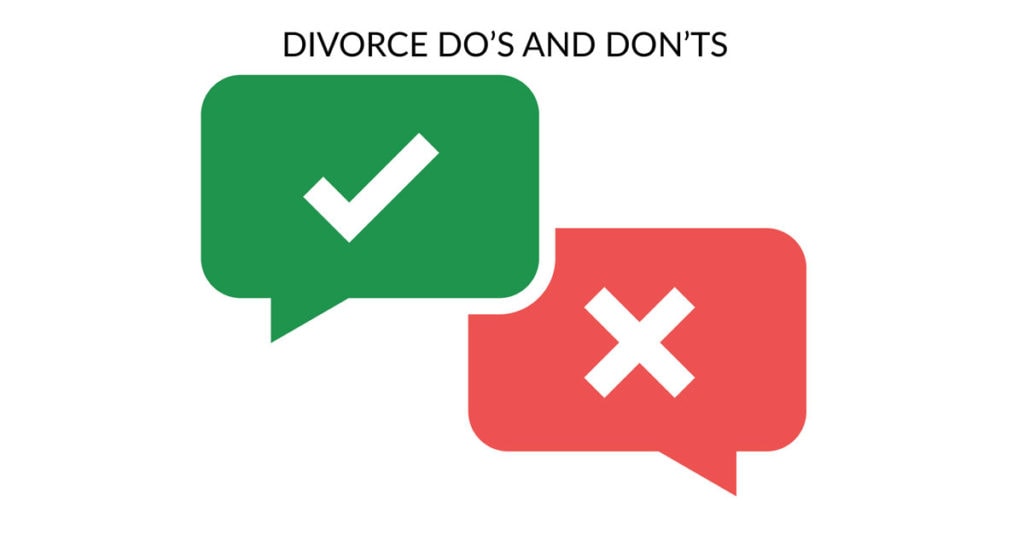List of Divorce Do’s and Don’ts
Divorce is seldom easy. If you are considering a divorce, there are many things you should start thinking about now. Asset and property division, child custody and child support, and business-related concerns are just some of the issues that can come up during divorce proceedings. Historically, women do not fare as well financially in divorce proceedings (most of the time), so proper planning is especially important and can help mitigate financial worries.
No matter what you do, remember that you deserve to feel emotionally fulfilled and valued in life. Getting a divorce is not abnormal. It does not mean you failed, and it does not mean you should feel shame. Sure, you may be upset or disappointed, that is only human.
By evaluating and planning for divorce, you can probably save yourself unneeded costs and stress. Here’s a list of Divorce Do’s and Don’ts that will help make the process easier.
Divorce Do’s
Let’s start with the do’s. These are not in any particular order, nor is this an exclusive list, but consider this as a type of checklist if you are considering divorce.
Do Evaluate Your Assets.
Evaluate your assets. Organize documents about any property you own, including bank accounts, investments, real property, and personal property. Consider what property you received before marriage and during the marriage. The property you receive during the marriage is more than likely considered community property and is divided differently than separate property. Note: community property is not necessarily split 50-50.
Do Talk to Your Spouse Calmly.
Think about whether the marriage is over and whether you think there is any chance for reconciliation. Some couples try counseling first, others may try to communicate on their own, but be sure you actually talk to your spouse even if you know it’s over. If nothing else, the people that benefit the most from your ability to communicate calmly during divorce are your kids.
Do Stay or Become Employed.
If you are not working, do consider getting a job, if possible. You are not guaranteed money from your spouse, even if you are not working. By the same token, if you are not working, you may still have to pay child support. If you do not have a job and your spouse does, and your spouse gets the kids, you probably will need to get a job to pay child support. Whether you are employed or not, make a budget and figure out what your expenses are, what the cost of renting an apartment or other place to stay is, any financial obligations you have, and don’t forget to factor in potential child support.
Do Make a Plan for Your Children.
Think about who they would live with, where they would go to school, and other things you believe are in their best interest. Think about how a divorce will impact your kids. What custody arrangement do you think will be in their best interest? If you think the best thing for the kids is staying with you most of the time, think about specific examples as to why that is.
Do Hire an Attorney.
Do think about hiring an attorney immediately, especially if your spouse already has one. You want your interests to be represented fairly.
Do Consider your Options.
Do consider mediation, collaborative divorce, and other methods of obtaining a divorce other than going to court.
Think about the various types of divorce, for example, contested versus uncontested, as well as the grounds for divorce that apply to you. Texas has a range of grounds, including insupportability, cruelty, adultery, felony conviction, abandonment, living apart, or confinement to a mental hospital. If any of these apply, think about whether you want to assert them in the divorce petition. Speaking of the divorce petition, think about who is going to file for divorce and where they will file.
Do Have a Support System.
There is no reason to handle your divorce alone. If you find your support system is not being particularly supportive or understanding, think about seeking counseling. A divorce can be an incredibly emotional experience and discussing your concerns with a professional can help you cope and keep emotions out of the divorce proceedings.
Do Think about Estate Planning.
Do think about estate planning or medical planning that you need to do. If you have a will and are getting divorced, did you name your spouse as an executor or beneficiary? If yes, you probably will want to change your will. The same goes for documents like a medical or financial power of attorney (giving someone power to make healthcare or financial decisions for you, respectively), and/or a HIPAA release (which allows someone access to your medical records), etc. Getting divorced does not automatically remove your spouse from any of these documents.
Do Have a Safety Plan.
If you need an exit strategy because your physical safety is at risk, meticulous planning goes a long way. Evaluate safety concerns for yourself and your kids. Police officers will escort you if needed and discussing this plan with an attorney can also be helpful.
Do Think about Changing Policies.
If you have insurance policies payable to your spouse, think about whether you want to change those or designate new beneficiaries.
Do Document Everything.
Think about keeping a set of records about your property, assets, accounts, etc. in a place your spouse does not have access to. Taking photos of the property, whether real property or personal property, that is important to you is also a good idea.
To recap, you should create a plan dependent on your needs. Anything from a physical exit plan to a general plan involving financial assets, children, and other logistics can be included.
Divorce Don’ts
Now, let’s think about some don’ts.
Don’t Begin a New Relationship.
Don’t begin a new relationship while your divorce is pending. If you do, don’t force the issue with your spouse. If your new relationship is the reason for the divorce, it is better to attempt to keep parties separate. For example, do not bring your new partner to divorce proceedings. If it hurts your new partner’s feelings, talk it out, but do not create situations that develop animosity from your soon-to-be former spouse. You do not want the divorce to get more contentious because of fired up feelings about new relationships if you can avoid it.
Don’t Take Extreme Measures.
Don’t take extreme measures like moving everything out of the house or leaving the state. When physical safety is involved, the measures you take may be more extreme, but if you are merely trying to shock your spouse, that is not a game worth playing.
Don’t Abandon Your Kids.
Even if you think your spouse will win custody, be sure to stay in your children’s lives. Supporting your kids is incredibly important to prevent trauma during a divorce and it can also work in your favor for custody reasons.
Don’t Quit Your Job.
Don’t quit your job to avoid paying child or spousal support. Chances are, you will have to pay anyway.
Don’t Hide or Underestimate Your Assets.
Don’t hide your assets or walk out the door with no records of your property, accounts, etc. Don’t underestimate your assets or ask for less money than you need to look money savvy.
Don’t Skip Planning.
Don’t file for divorce without planning. Divorce proceedings alone can get expensive, not to mention living expenses. Think about how much money you need and save it (or at least some of it) before you walk out.
Don’t Post on Social Media.
Don’t post about your divorce on social media while proceedings are underway. If you really want to play it safe, do not post on social media about the divorce after either. Why? Because everything you post is potential fuel for your spouse in future proceedings, particularly if you have kids and may end up back in court.
Don’t make bad or rash decisions that you think would look bad if it came up in court. This is a good way to evaluate whether decisions you are making are worth doing in the moment.
What Signs Should You Look for if you Think Your Spouse is Considering a Divorce?
- Your spouse hired an attorney but will not tell you what he or she is for.
- Your spouse is transferring assets without conferring with you or without sharing any details with you.
- Your spouse is traveling a lot more than usual, not communicating with you, and/or non-responsive to your attempts to communicate.
- Your spouse is discussing a fresh start that is not work-related or is not sharing details about it with you.
Most of these issues fundamentally break down into a “gut-check” for you. If things feel weird to you and your repeated attempts to communicate with your spouse are going unreciprocated, it may be time to consider evaluating what is happening within the marriage.
Should you Hire a Private Investigator?
Our firm has an excellent investigator we use with over three decades of experience in law enforcement. It may be wise to use a private investigator depending on your goals and your attorney’s advice. For more information about our team or to schedule a consultation, call 817-900-3220.




